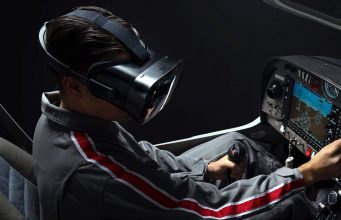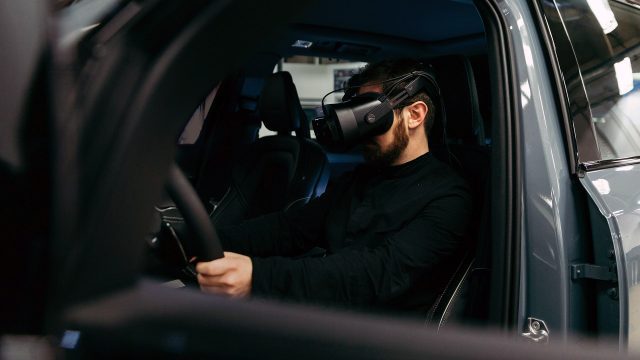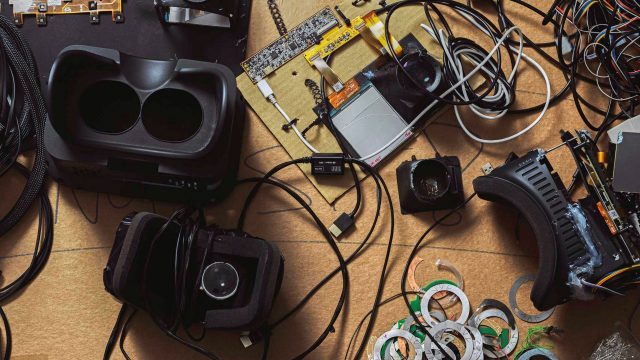
Finland-based startup Varjo, maker of high-end enterprise VR headsets, has built an impressive product and charted a rapid growth, seemingly similar to the early years of Oculus. Now with 150 employees and some $46 million in venture funding, Varjo is aiming to make its headset lineup more widely accessible.
After an impressive demo of Varjo’s ‘workspace’ concept earlier this month, I sat down with CEO Niko Eiden and got a glimpse of the company’s focus and heading.
To Be (a Platform) or Not to Be
Eiden told me that Varjo isn’t planning to make an ecosystem play. Rather than profiting by owning a platform and the means of content distribution (as Facebook, Valve, HTC, and others are focused on) Varjo intends to be a product company—one which primarily profits from the sale of its hardware. The company’s headsets are currently compatible with OpenVR (the foundation of SteamVR), and every Varjo headset includes SteamVR Tracking built in.
More Affordable Headsets for a Broader Appeal

Even among enterprise-focused headsets, Varjo’s are expensive. As the only headset on the market offering genuine retina resolution (at least in the central part of the field of view) the company at least has a truly unique differentiator which to justify the premium $5,000 pricetag for use-cases which demand visual fidelity that matches human eyesight. Even so, Varjo hopes to make its headsets more affordable in the future.
Eiden said that Varjo’s goal is to eventually make its products affordable enough that individual employees could reasonably ask their employer for the headset—the same way they might ask their department for a high-end monitor—whereas the cost today means there generally needs to be a very specific use-case and ROI in mind, which has kept Varjo’s headsets largely in the realm of Fortune 500 companies.
Indeed, impressive companies like Volvo, Audi, Saab AB, and Siemens PLM—companies with market caps in the tens of billions of dollars—are among Varjo’s “hundreds” of customers, Eiden said. But it’s going to take a cheaper headset for Varjo to reach medium-sized businesses, and to see its vision of seamless VR enterprise workflows come to fruition.

Exactly where the price will fall, Eiden didn’t say, but with HTC’s Vive Pro Eye (perhaps the most complete enterprise-focused offering out there) at $1,600, somewhere between that and $3,500 (the price of well equipped workstation PC) seems reasonable.
Startup Trajectory
Since its founding in 2016, Varjo has grown quite rapidly. Eiden confirmed the company now has some 150 employees, about half of which he said are focused on hardware, with the other half on software. Varjo has raised some $46 million to date, and Eiden told me that the company is in the midst of raising its Series C funding round with a goal in the neighborhood of $55 to $110 million.

As far as a the trajectory of a VR headset startup, that puts Varjo just about in a league of its own, with the nearest comparable seemingly being Oculus itself, which, over the course of about three years, raised nearly $100 million before being acquired by Facebook in 2014. Other VR headset startups out there which come close are Pico and Pimax, though neither have amassed the same level of funding.
Vision Driven
There’s a big question still in the air for Varjo. If the company doesn’t plan to own an ecosystem, what will differentiate its headset once others catch up with retina resolution visuals? For Eiden, the and rest of the company, the long term vision of the ‘workspace’ concept seems to be the pillar around which the company plans to ultimately build. “When we’re done, computers will look nothing like they do right now,” the company says.
The post Now 150 People Strong, Varjo Talks Future Focus, More Affordable Headsets appeared first on Road to VR.
Ream more: https://www.roadtovr.com/varjo-ceo-interview-niko-eiden/
No comments:
Post a Comment